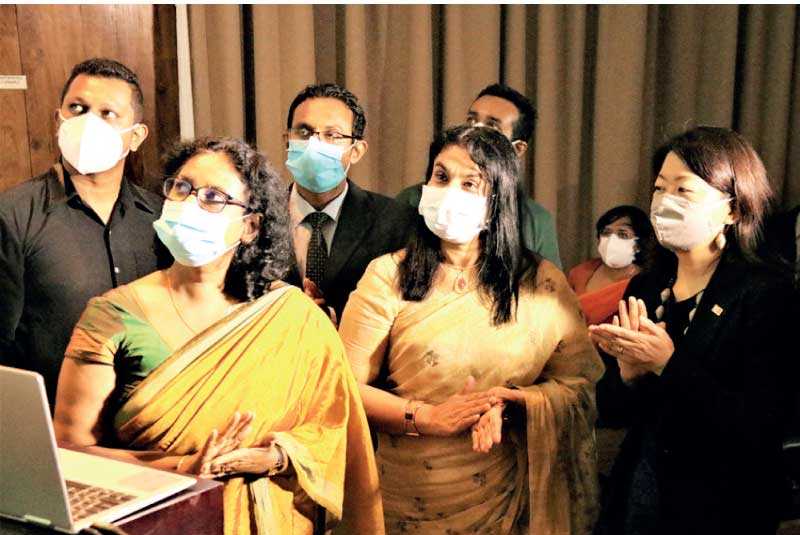Wednesday Feb 25, 2026
Wednesday Feb 25, 2026
Monday, 9 November 2020 03:18 - - {{hitsCtrl.values.hits}}

UNFPA Representative in Sri Lanka Ritsu Nacken, National Cancer Control Programme Acting Director Dr. Janaki Vidanapathirana, and Additional Secretary to the Ministry of Health Dr. Laksmi Somathunga photographed launching the Aayu+ platform
|
UNFPA Representative in Sri Lanka Ritsu Nacken
|
It is estimated by the World Health Organization (WHO) that one-third of cancers can be prevented through healthy lifestyle choices.
Yet cervical and breast cancer are a global public health issue that is currently claiming millions of innocent lives, with more than two-thirds of these cases occurring in the developing countries where the health sector lacks the capacity and infrastructure to combat the threat effectively. Breast cancer and cervical cancer are the most common types of cancer among women in Sri Lanka.
As the UN’s lead sexual and reproductive health agency, the United Nations Population Fund (UNFPA) in Sri Lanka recognises the strong links between preventing and controlling non-communicable diseases and protect and promote the advancement of healthy lifestyles amongst women and girls.
Despite the gap of data since 2014 on the status and causes of cancer within Sri Lanka, the Ministry of Health has been making innovative efforts such as the pilot project in rolling out the HPV DNA testing in Kalutara.
The project was implemented through the Well Woman Clinic Programme in partnership with UNFPA. Efforts such as this are being pursued as technological advances reveal that primary prevention of cervical cancer is possible through HPV vaccinations and secondary prevention is possible through HPV testing. Another such effort was launched recently, titled Aayu+, by the National Cancer Control Program in partnership with UNFPA. The exclusive social media platform utilises the engagement of local celebrities and social media influencers who will talk about reproductive and other forms of cancers to bust myths and to encourage health-seeking behaviour among the general public of Sri Lanka, and youth in particular. The platform will use various forms of engagement such as poetry, vlogs, short stories, infographics and memes to further its reach amongst different pockets of the island’s demography. In her opening remarks, National Cancer Control Programme Acting Director Dr. Janaki Vidanapathirana stated: “Locally, around 23,000 people are diagnosed with cancer every year. I am requesting the mainstream media present, who hold immense power, curate content that will decrease the taboo, encourage early detection and drive people to access services to help save lives!”
Delivering her speech on the power of social media, UNFPA Sri Lanka Representative Ritsu Nacken highlighted: “There are numerous examples where social media played a critical role in mobilising social change. UNFPA has seen an extraordinary increase in engagement through social media platforms during the lockdown on pertinent issues such as gender-based violence, elder abuse, and youth participation in decision-making. Social media can be a great tool to address social norms around cancers, as well.”
Also speaking at the event, Additional Secretary to the Ministry of Health Dr. Lakshmi Somathunga elaborated: “We must promote early communication around the causes and detection of cancer. I believe this initiative is ideal to reach young audiences to curb destructive habits such as tobacco and alcohol which are causes of cancer.” UNFPA worldwide is accelerating its efforts to deliver on our three transformational results: zero maternal death, zero unmet need for Family Planning and zero violence against women and all harmful practices, that contribute to the 2030 Sustainable Development Goals. UNFPA is making a significant contribution to the elimination of cervical cancer globally and has long supported the Ministry of Health, NCCP and Well Woman Clinics to curb the prevalence and mortality of cancer within Sri Lanka and will continue these efforts.